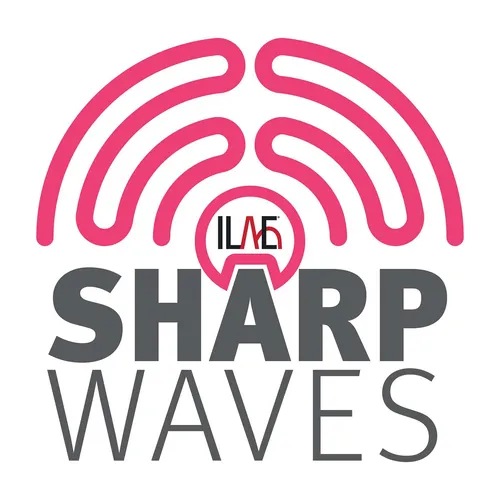
Sharp Waves: ILAE's epilepsy podcast
Epilepsy affects more than 50 million people. Every day. Sharp Waves brings you stories about people with epilepsy, physicians treating epilepsy, and researchers studying the condition. We'll cover the latest research, challenges to diagnosis and treatment, and issues from around the world.
- Update frequency
- every 13 days
- Average duration
- 25 minutes
- Episodes
- 89
- Years Active
- 2021 - 2025

Research recap: Empiric immunotherapy for highly refractory epilepsy: Dr. Elisabeth Doran
In a retrospective study of 31 patients with highly refractory epilepsy, 29% had more than a 50% reduction in seizures for at least 12 months after being treated with immuno…

Genetic testing: Variants of uncertain significance (VUS) - Dr. Gemma Carvill
What are variants of uncertain significance (VUS) in epilepsy genetic testing? How are they defined, and can those definitions change over time? Sharp Waves talks with Dr. G…

What's new in status epilepticus: Dr. Eugen Trinka
This episode covers a wide scope of issues, including treatment options, treatment response, prognosis and the role of seizures versus the underlying etiology, most common e…

Valproate and reproductive risks in women and men with epilepsy: Dr. Tony Marson
In use since the 1970s, valproate is highly effective for genetic generalized epilepsies and some forms of pediatric epilepsy. The medication also is associated with a 10% r…

ILAE Updated seizure classification: Dr. Sandor Beniczky
ILAE's updated seizure classification position paper was published in Epilepsia in April 2025. Sharp Waves talked with Dr. Sandor Beniczky about the updates and how they wil…

Documentary filmmaker confronts epilepsy in a new memoir: Stacia Kalinoski
Seizures cost Stacia Kalinoski her career in broadcast journalism and forced her to give up running. In her new memoir, Kalinoski recounts her journey from first seizure in …

Work-life balance: Dr. Sheryl Haut
Work-related stress and burnout are common in physicians, with rates of burnout estimated between 25% and 60%. These stresses impact physician health, patient care, and heal…

The role of microglia in epilepsy: Hero, villain, or both? Dr. Amy Brewster
Microglia can have protective and also potentially harmful effects in the brain. They seem to be involved in dampening the nervous system during acute seizures – but also ap…

Language models reveal concerns of people with epilepsy in online discussions
Many of the most common concerns of people with epilepsy are topics they don't usually talk about with physicians. This is one of many findings of a study using AI to analyz…

Music, epilepsy, and the brain: Dr. Phillip Pearl & Prof. Nigel Osborne
Music can affect emotions, spark memories, and influence mood. In cases of musicogenic epilepsy, music can trigger seizures. In other cases, music may reduce seizure frequen…

Genetic testing for epilepsy in low-resource regions
In lower- and middle-income countries, raising awareness of genetic etiologies in epilepsy and genetic testing options may ultimately shift national priorities toward making…

Emergency diagnosis and treatment of status epilepticus
As a neurological emergency, status epilepticus (SE) requires timely diagnosis and treatment. A US study found that 10% of people with SE were not diagnosed by emergency ser…

Folic acid supplementation in women with epilepsy
Folic acid supplementation is recommended for all women with epilepsy who may become pregnant. However, there is no agreed-upon dose for women with epilepsy taking antiseizu…

High-frequency oscillations and epilepsy: Clinical and basic science perspectives
High-frequency oscillations (80 to 500 Hz) are being studied as biomarkers of epileptogenic areas in the brain, as well as markers to be used in epilepsy surgery. Dr. Cecili…

Finding epilepsy genes: Dr. Allan Bayat
There are potentially hundreds of "epilepsy genes" - but what is an epilepsy gene? How do researchers discover these genes and associate them with epilepsy? Sharp Waves spok…

Genetic testing for epilepsy surgery: Dr. Pat Moloney
In the second episode of our genetics and epilepsy series, Sharp Waves explores how genetic insights can inform considerations and outcomes of epilepsy surgery. Dr. Alina Iv…

Genetic testing in epilepsy: Who, how, and why? Dr. Ilona Krey
This first episode in a multipart series on genetics in epilepsy covers the basics of genetic testing. Dr. Alina Ivaniuk interviews Dr. Ilona Krey, a physician and researche…

Epilepsy surgery outcomes: Two experiences with life-changing consequences
Christina Rezek and Brad Levy each have daughters who underwent epilepsy surgery, with dramatically different results. Sharp Waves talked with them about the journeys to and…

Heart health and SUDEP in people with epilepsy: Dr. Katia Lin and Dr. Guilherme Fialho
Sharp Waves spoke with a neurologist and a cardiologist who are part of a team researching the interactions among seizures, heart function, heart health, and SUDEP. Learn mo…

Exercise and epilepsy: Research and myths
In this episode, we explore the science behind exercise as an adjunct treatment for epilepsy and debunk some common myths (spoiler alert: With very rare exceptions, exercise…